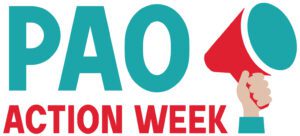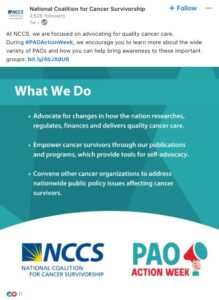
Rare Community Profiles is a Patient Worthy article series of long-form interviews featuring various stakeholders in the rare disease community, such as patients, their families, advocates, scientists, and more.
Astellas Pharma’s Dr. Anthony Yanni Discusses the Success of the First-Ever Patient Advocacy Organization Action Week (PAOAW)
Patient advocacy organizations (PAOs) are important resources for the over 205 million Americans living with chronic health conditions. These PAOs support and advance research, advocate for patient needs, provide invaluable resources and support for patients and caregivers alike, increase awareness, and even collaborate with industry and researchers to develop more patient-centric processes. Yet many individuals with rare or chronic conditions remain unaware of these amazing support networks. In fact, 75% of this community has never engaged with a PAO.
To address this gap, Astellas Pharma, along with a coalition of 51 other organizations from healthcare and life science to PAOs, launched a community-driven initiative called Patient Advocacy Organization Action Week (PAOAW). This initiative is aimed at highlighting the essential role of PAOs in healthcare, a role that Astellas’ Dr. Anthony Yanni says is often overlooked:
“It’s time for PAOs to have the recognition they deserve for the great work that they do.”
To learn more about this groundbreaking initiative—and how it might develop in the future—Patient Worthy recently sat down with Dr. Yanni. Our discussion spanned from the importance of patient-centricity to how PAO Action Week can transform patient care through increased engagement with advocacy organizations.

Recognizing the Needs of Patients
Dr. Yanni, an MD by training who serves as Astellas’ Senior Vice President and Head of Patient Centricity, noticed the need for patient-centricity in healthcare as soon as he transitioned into the pharmaceutical sphere from clinical patient care, where he had practiced the full spectrum of primary care medicine for 13 years before becoming CMO of a hospital system. Says Dr. Yanni:
“I’ve been fortunate to see healthcare from all different perspectives. When I joined pharma 15 years ago, the importance of patient-centricity struck me. Why aren’t we understanding the real-world setting of patients and the challenges they face that complicate good care?”
He entered his role at Astellas intent on advancing patient-centric drug development; since he began, he’s spearheaded five teams to ensure that patient insights are part of the decision-making process from ideating to delivery. To Dr. Yanni, there are two components of patient-centricity that characterize this process: operational (creating specialized teams to integrate patient insights) and cultural (creating a culture that centers on the patient experience). He shares:
“The operational piece is only sustainable if we create a culture where everyone, everywhere, in every role knows that they are contributing to a patient solution. We want to not just create a narrative but processes that team members can participate in to reinforce their understanding that they are doing something remarkable.”
One of these processes is what Dr. Yanni affectionately calls the Patient Centricity Solve-a-Thon. Astellas team members across the globe can identify where they see patient gaps and opportunities and identify solutions. Reminiscent of Shark Tank, the best ideas are then advanced and refined, with winners receiving a stipend and mentorship to further develop their solutions.
PAO Action Week was one of three winners of the last solve-a-thon—and has already had an incredible impact on the rare community.

The Inaugural PAO Action Week
The Astellas team knew why they wanted to implement PAO Action Week, says Dr. Yanni:
“The driving force behind this initiative is that PAOs deserve the credit that they don’t universally get from industry.”
At the same time, Dr. Yanni saw PAO Action Week as the ideal opportunity to address the lack of PAO awareness in the rare disease community:
“From my clinical practice experience, I’ve seen that people with rare diseases don’t necessarily have somewhere to learn about their disease. They want to link up with people who have gone through similar situations, but don’t know where to turn. If you have a strong network that you’re leaning on, you may not seek out the great resources of a PAO. Our Action Week is meant to address the lack of information and to encourage people: lean in, don’t lean away.”
The inaugural PAO Action Week set out to connect patients and caregivers with relevant advocacy groups among the over 1,200 PAOs operating nationwide. Participants included a healthcare organization, two professional medical societies, two companies, and 47 PAOs, including the Friedreich’s Ataxia Research Alliance (FARA), Gastric Cancer Foundation, and Black Women’s Health Imperative (BWHI). Says Dr. Yanni:
“Our team cast a wide net. There were no restrictions for anybody who wanted to join, including other companies. We believe that patient-centricity in this space should not be competitive. Our goal is to see everybody adopt patient-centric drug development and implement patients into their processes. We want everyone to join together to support and celebrate PAOs, and to share the work that they do with rare communities. There are no downsides and no advantages to be gained. We simply want PAOs to be recognized for the work that they do.”
The response to PAO Action Week was incredibly positive. PAOs were thankful to be highlighted and for the opportunity to increase community connectivity, educate patients and caregivers, and increase disease awareness. The PAO Action Week website received more than 3,000 page views—and the campaign overall had the potential to reach over 227 million people in the U.S. Ninety-one percent of participants said they would participate again next year.

Should the 2nd Annual PAO Action Week occur, Dr. Yanni would love to see more engagement—from both PAOs and other companies. He wants other companies to know that their inclusion into the initiative is not just encouraged, but welcomed:
“I would love to see this happen again with broader participation among patients and industry. Again, this is not a competitive project. We want year two to be even bigger and better so we can show patients that there is help and there is assistance available.”
Learn more about PAO Action Week here.





